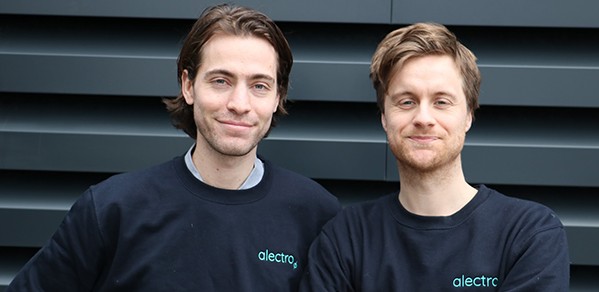
Alumni Tim Geller and Bertie Ivory-Peters first met on the Department’s MPhil programme in Nuclear Energy and soon realised that they shared a common goal: to help reduce the speed and impact of climate change. In 2019, the two joined forces to found Alectro – an on-demand software platform providing insight to organisations on the extent of their carbon emissions.
The MPhil in Nuclear Energy is fascinating, challenging and engaging. It pushed us hard and the sense of achievement at the end was phenomenal. If you’re thinking about applying, absolutely do!
Tim Geller and Bertie Ivory-Peters
Alectro’s vision is to encourage every business and employee to take responsibility for improving their own carbon footprint. To help with this process, Tim and Bertie have developed a Virtual Sustainability Officer™ platform, providing companies and employees with the tools they need to successfully deliver a comprehensive net zero strategy. The platform consists of a text-based algorithm that takes a bottom-up approach to analysis. It takes historical data, makes trend-based predictions and auto-generates data in real-time. Employees also have access to the platform, providing them with a breakdown of their own individual impact and opportunities to actively engage in their employer’s sustainability strategy.
With more than 30 clients spanning three continents, Tim and Bertie are enjoying a period of rapid expansion. Here they share their story.
Our vision is to empower every employee to become a ‘climate champion’. Employees can play an active role in helping their company drive towards net zero for this generation and the next. Our platform enables employers to provide a tangible benefit for each employee and tackle their own sustainability agendas at the same time. If companies act on agendas at a minimum of board level, and ideally make sure that they involve the whole company, the sustainability agenda can be brought into all business decisions. Our platform assists in this process by providing easy-to-use measurement tools, as well as empowering all employees to contribute to, learn about, and challenge the company sustainability agenda moving forward.
From the electricity used to heat buildings to the coffee people drink at work, analysing and interpreting this data can help companies and organisations to supercharge their sustainability strategies. With the help of a bottom-up, text-based algorithm, our platform enables companies to dynamically see the direction that their emissions are moving in, without having a time burden attached or a need for constant administration. Our platform recognises items on a line-by-line basis including expenses and other raw-data sources such as asset lists and cloud computing uptimes, rather than by overall spend data. This means that companies can start making informed and detailed decisions that impact their value chain in specific areas. For example, ‘the coffee people drink at work’ is often overlooked in day-to-day business and this sort of data is really important for SMEs. By analysing this data, we can change the purchasing decisions of companies and ensure that their supply chain is as green as they would like it to be. Likewise, when looking at air travel, for example, our text-based model can recognise a specific route or class of flight, in addition to the total cost and distance travelled. This provides a more accurate understanding of what that distance travelled actually is, and the associated impact of flight class, therefore allowing a company to understand the breakdown of the tonnes of carbon dioxide equivalent and target specific reductions from a few very carbon intense flights, rather than from a blanket reduction.
Without the MPhil in Nuclear Energy, we would not have started Alectro. We both chose to study this topic, because we wanted to contribute to reducing the speed and impact of climate change. One of the best aspects of the MPhil is the ability to customise it to the outcomes that you want. The core modules gave us hard technical skills, but also delivered softer skills like presenting and debating. The elective modules allowed both of us to tailor the experience to exactly what we were interested in. By chance, we ended up doing many of the same elective modules, including some hosted by the Cambridge Judge Business School and some which were held in other areas of Department of Engineering.
We met sharing a common goal, bonded through shared interests, and launched Alectro with the skills we developed in Cambridge. The MPhil gave us the deep technical skills needed to tackle industry-leading problems. Most importantly, we were able to interact with our peers in a range of disciplines, including during the debating exercise, where we had our first project together. We wrote our theses on scenario analysis and energy modelling to 2050, and the challenges facing global energy collaboration – topics that directly translate to the work we now do at Alectro. The MPhil itself is fascinating, challenging and engaging. It pushed us hard and the sense of achievement at the end was phenomenal. If you’re thinking about applying, absolutely do!

